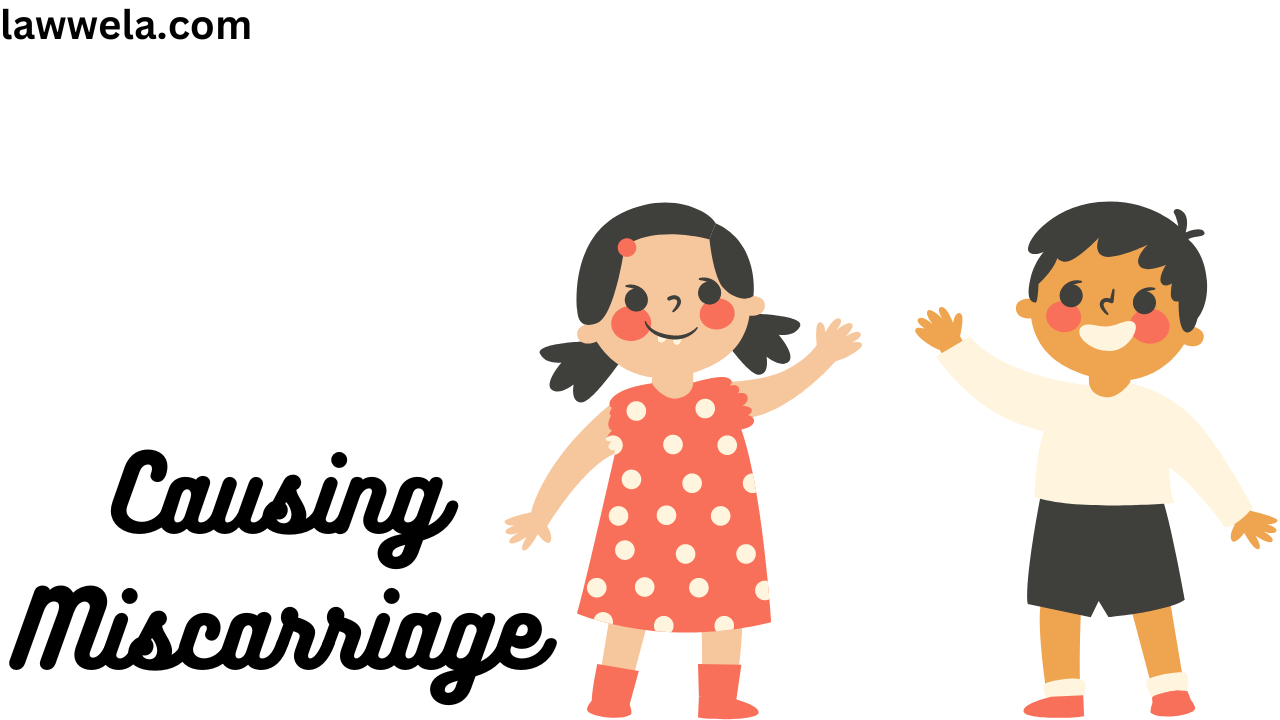Causing miscarriage section 312
whoever causes a woman with child to miscarry with no good faith to save the life of the woman will be punished with imprisonment of either description or a term which may extend to 3 years or a fine or with both under section 312 of Indian Penale Code and if the woman be quick with child shall be punished with imprisonment of either description or a term which may extend to 7 years and shall be liable to fine.
Explanation
the meaning of this section is that a woman causes herself to miscarry
Causing miscarriage without woman’s consent 313
Whoever commits the offence without the consent of the woman whether the woman is quick with a child or not, shall be punished with imprisonment for life or imprisonment for 10 years and a fine. It is cognizable- non-bailable- trial by session court and non-compoundable.
Death caused by act done with the intent of causing miscarriage 314
Whoever with intent to cause a miscarriage of a woman with a child does any act which causes the death of such woman shall be punishable for 10 years and fine. It is a cognizable offence- non-bailable- trial by session court and non-compoundable.
If the act is done without the consent of the woman
If the act is done without the consent of a woman shall be punishable by either imprisonment for life or with the punishment mentioned above. It is a cognizable offence- non-bailable- trial by session court and non-compoundable.
Explanation
It is not essential to this offence that the offender should know that the act cause deand ath.dealion 312, 314 deals with causing miscarriage and aggravated forms of the offence, where miscarriage is caused without the consent of the woman and where it results in the death of the woman.
Essential ingredients
Voluntarily causing miscarriage
appliesn is applicable to those cases where the miscarriage is done voluntarily and not as a result of any mishap or accident. Section 39 of the IPC defines voluntarily which means intending to cause an effect. An important ingredient is an Intention to cause miscarriage or mens rea of the off There are also such medicines provided to a pregnant woman that cause abortion.
Woman with child
The meaning of the word woman with a child means a woman is pregnant. The moment a woman conceives or the pregnancy starts the woman is said to be with a child. the factum of pregnancy is an important ingredient. If a woman is under misconception whether she is pregnant or not and takes an abortive pill and another helps her neither of them is punished because she was not pregnant in the first place.
Woman quick with child
The term quick with child is refer to the more advanced stage of pregnancy. Quickening means when a pregnant woman starts to feel that the fetus has been placed or the embryo has taken the foetus form. When the mother feels the movement of the unborn child. Causing miscarriage of a woman quick with child is more graver offence. so in the former, the punishment is simple or rigorous imprisonment for a term up to 7 years and a fine in the latter the term of imprisonment extends to 3 years with a fine or both.
Miscarriage
Miscarriage is not defined in the IPC. Miscarriage is synonymously used with the word abortion. There are three terms in Medical used abortion, miscarriage, and premature labour to denote the expulsion of a foetus at different stages of gestation. The term abortion is used only when an ovum is expelled within the month of pregnancy before the placenta is formed. Miscarriage means when a foetus is expelled from the uterus from the 4 to the 7 months of gestation before it is viable. Premature labour is the delivery of a viable child, possibly capable of being reared before it becomes fully mature.
Section 315 intends to prevent the child from being born alive or to cause it to die after birth
Whoever before the birth of any child does any act with intentions which leads it to die or prevent that child from being born alive or cause it to die after its birth. If such an act is not caused in good faith for the purpose of saving the life of the mother shall be punishable with imprisonment for 10 years or with a fine or both.
Death of a quick unborn child under section 316
Whoever does any act under such circumstances and if he thereby caused death he would be guilty of culpable homicide and does by such act cause the death to quick unborn child shall be punishable with imprisonment of either description for a term which may extend to 10 years and also be liable for fine.
Essential ingredients
Some Acts before the birth of the child
An offence under these two sections is that the culpable act or the actus reus should be done before the birth of the child. The act done before the birth of the child should result in preventing the child from being born alive or causing it to die after its birth. If the act of killing the child is done after its birth it will be a case of murder or culpable homicide. It is only injury caused to an unborn child which is covered by this section.
Intention
Another important element of an offence under section 315 is to prevent the child from being born alive or cause it to die after its birth. If the act is done with good intentions for the purpose of saving the life of the mother then no offence is made out.
Abandonment and exposure of an infant
Section 317 exposure and abandonment of a child
Whoever being the father or mother of the child who is under the age of 12 years or any person who is taking care of the child shall expose or leave the child in any place with the intention of fully abandoning such child, shall be punished with imprisonment of either description for a term which may extend to 7 years or with fine or with both. The word “expose or leave” means leaving a child in danger, neglecting the child, and not protecting the child from natural elements like cold, heat, and other hazards.
Essential ingredient
Children under 12 years of age
According to Section 317 of IPC is only applicable where exposure or abandonment of a child below the age of 12 years. This section is made to protect the child because they are not capable of protecting themselves. The primary responsibility is on the parents or adults who may have the child’s custody. It applies equally to legitimate or illegitimate children. This provision makes both parents equally responsible for taking care of the child. Apart from this the section also makes the person under whose care the child is placed. And they are equally liable. This daycare, orphanages, crèches, etc. all are covered in this section.
Death of a child due to consequences of the exposure
When the child dies due to exposure and abandonment under 12 years of age then the father, mother, or person under whose care the child left. They will be liable for murder or culpable homicide as given in this section’s explanation.
This explanation will only apply if the child dies due to the consequences of the exposure or with the knowledge that it is likely to cause death.
Section 318 Concealment of birth of a child
Secret disposal of dead body
When somebody secretly buries or otherwise disposes of the dead body of a child whether the child dies before or after or during its birth intentionally conceals the child, shall be punishable for 2 years, with a fine, or with both. The meaning of this section is secretly burying or disposal should the dead body of the child not be in the stage of mere embryo or fetus. It should be capable of living.
Essential ingredient
In India, we have the Registration of Death and Birth Certificate Act 1969, which makes it compulsory to register every birth or death with local authorities. The main purpose of this section is to protect infanticide. In India, they still believe in birth of a girl child is a curse and a burden because of this female infanticide is very high. In most cases, they are buried secretly and disposed of the girl child’s body or thrown into rivers, wells, or left in the dustbins to die.


1 thought on “Section 312-318 Causing Miscarriage”